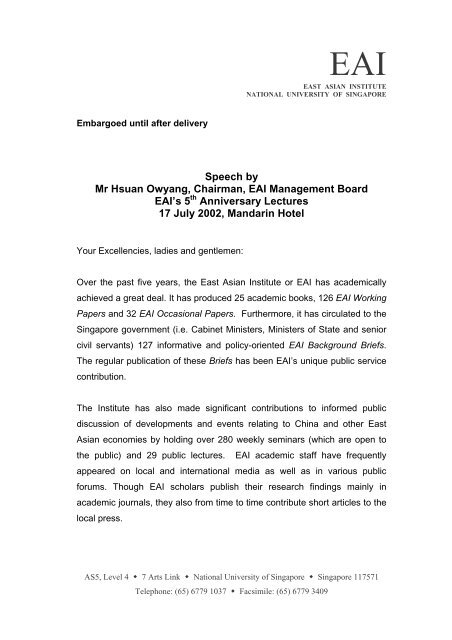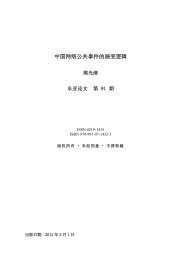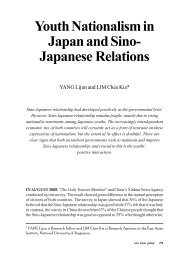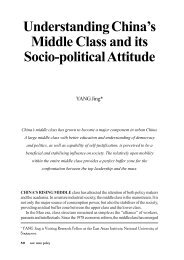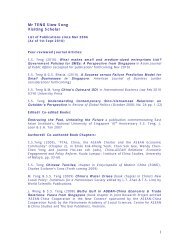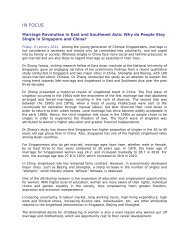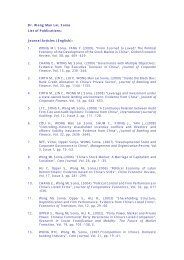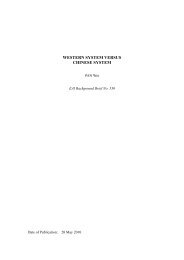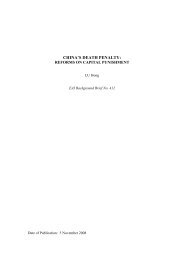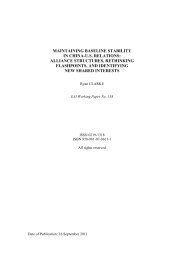Speech by Mr Hsuan Owyang, Chairman of EAI Management Board
Speech by Mr Hsuan Owyang, Chairman of EAI Management Board
Speech by Mr Hsuan Owyang, Chairman of EAI Management Board
Create successful ePaper yourself
Turn your PDF publications into a flip-book with our unique Google optimized e-Paper software.
<strong>EAI</strong><br />
EAST ASIAN INSTITUTE<br />
NATIONAL UNIVERSITY OF SINGAPORE<br />
Embargoed until after delivery<br />
<strong>Speech</strong> <strong>by</strong><br />
<strong>Mr</strong> <strong>Hsuan</strong> <strong>Owyang</strong>, <strong>Chairman</strong>, <strong>EAI</strong> <strong>Management</strong> <strong>Board</strong><br />
<strong>EAI</strong>’s 5 th Anniversary Lectures<br />
17 July 2002, Mandarin Hotel<br />
Your Excellencies, ladies and gentlemen:<br />
Over the past five years, the East Asian Institute or <strong>EAI</strong> has academically<br />
achieved a great deal. It has produced 25 academic books, 126 <strong>EAI</strong> Working<br />
Papers and 32 <strong>EAI</strong> Occasional Papers. Furthermore, it has circulated to the<br />
Singapore government (i.e. Cabinet Ministers, Ministers <strong>of</strong> State and senior<br />
civil servants) 127 informative and policy-oriented <strong>EAI</strong> Background Briefs.<br />
The regular publication <strong>of</strong> these Briefs has been <strong>EAI</strong>’s unique public service<br />
contribution.<br />
The Institute has also made significant contributions to informed public<br />
discussion <strong>of</strong> developments and events relating to China and other East<br />
Asian economies <strong>by</strong> holding over 280 weekly seminars (which are open to<br />
the public) and 29 public lectures. <strong>EAI</strong> academic staff have frequently<br />
appeared on local and international media as well as in various public<br />
forums. Though <strong>EAI</strong> scholars publish their research findings mainly in<br />
academic journals, they also from time to time contribute short articles to the<br />
local press.<br />
AS5, Level 4 • 7 Arts Link • National University <strong>of</strong> Singapore • Singapore 117571<br />
Telephone: (65) 6779 1037 • Facsimile: (65) 6779 3409
Looking back, a number <strong>of</strong> factors have contributed to the Institute’s<br />
success. To begin with, <strong>EAI</strong> did not really start as a completely new research<br />
outfit five years ago. In fact, it was the lucky descendent <strong>of</strong> a wellestablished<br />
academic pedigree in Singapore.<br />
In 1983, Dr. Goh Keng Swee (then Deputy Prime Minister and Minister for<br />
Education) established the Institute <strong>of</strong> East Asian Philosophies (IEAP) for<br />
the study <strong>of</strong> Confucian ethics and Asian values. In 1992, IEAP was reconstituted<br />
and re-named the Institute <strong>of</strong> East Asian Political Economy or<br />
IEAPE in order to shift its research focus from classical studies to research<br />
on contemporary China. In 1997, IEAPE (which was a privately-constituted<br />
non-pr<strong>of</strong>it organization) was closed down to make way for the Institute to<br />
become part <strong>of</strong> the National University <strong>of</strong> Singapore under the present<br />
name, the East Asian Institute.<br />
Thus, <strong>EAI</strong> did not sprout up from nowhere. It is a classical case <strong>of</strong> change<br />
and continuity. In the process, <strong>EAI</strong> has benefited a lot from the academic<br />
traditions <strong>of</strong> its predecessors. It also inherited their academic network. More<br />
concretely, it took over IEAPE’s well-established library and data base as<br />
well as its endowment. This explains why <strong>EAI</strong> could produce such good<br />
results so quickly.<br />
On this occasion, I would like to pay special tribute to Dr. Goh Keng Swee,<br />
who unfortunately cannot be with us here this afternoon. Dr Goh has been<br />
widely acclaimed as the architect <strong>of</strong> Singapore’s successful economic<br />
development. He has also pioneered many things in Singapore, including<br />
modern Chinese studies. After his retirement from politics in 1985, he<br />
developed a strong interest in contemporary China. In fact, he was<br />
appointed an economic advisor <strong>by</strong> the Chinese government. Dr. Goh has<br />
left behind some valuable legacies with <strong>EAI</strong>.<br />
2
In the last five years, <strong>EAI</strong> has grown from strength to strength, under the<br />
able leadership and guidance <strong>of</strong> its Director, Pr<strong>of</strong>essor Wang Gungwu, and<br />
its Research Director, Pr<strong>of</strong>essor John Wong. Pr<strong>of</strong>essor Wang Gungwu, an<br />
internationally well-known China scholar himself, has accumulated a lot <strong>of</strong><br />
useful experiences for running academic institutions, first as Director <strong>of</strong> the<br />
School <strong>of</strong> Pacific Studies at Australian National University and subsequently<br />
as Vice-Chancellor <strong>of</strong> the University <strong>of</strong> Hong Kong. Pr<strong>of</strong>essor Wang quickly<br />
brought his experiences to bear <strong>by</strong> charting new directions and setting up<br />
important development guidelines for the Institute. Largely because <strong>of</strong> his<br />
international academic reputation, the Institute was able to recruit many wellqualified<br />
China scholars and to attract many eminent academic visitors from<br />
abroad. Personally, I think the Institute is fortunate to have Pr<strong>of</strong>essor Wang<br />
as its first Director. I am sure in the future he too will leave his legacies<br />
behind.<br />
Pr<strong>of</strong>essor John Wong is a long-time China expert. He started to specialize in<br />
China back in the early 1960s. John told me that he had also learnt a lot<br />
from Dr. Goh Keng Swee on the practical aspects <strong>of</strong> “China watching”, when<br />
he worked under Dr Goh as Director <strong>of</strong> IEAPE. Accordingly, John was able<br />
to quickly put various research programmes in place and started to produce<br />
papers with little delay. In fact, John was able to work closely and effectively<br />
with Gungwu as a team; and the two have worked very hard to put <strong>EAI</strong> on<br />
the map, making it a lively intellectual centre for contemporary China studies<br />
in the region.<br />
As <strong>Chairman</strong> <strong>of</strong> the <strong>Management</strong> <strong>Board</strong>, my main role is to oversee the<br />
general development <strong>of</strong> the Institute. The <strong>Board</strong> from time to time <strong>of</strong>fers<br />
some broad policy guidelines; but it is usually up to the Institute’s leadership<br />
to organize the necessary resources for their implementation. We all know<br />
that research is a highly personalized activity; research productivity<br />
ultimately depends on the performance <strong>of</strong> individual scholars. In other<br />
words, the Institute’s research output <strong>of</strong> the past five years, is actually the<br />
sum total <strong>of</strong> all the individual efforts <strong>of</strong> more than 50 scholars who have<br />
3
come to work at the Institute in various capacities. In a sense, every past<br />
and present member <strong>of</strong> the Institute has contributed to its achievements. I<br />
would like to congratulate all <strong>of</strong> them.<br />
Last but not least, I must stress that the Institute also owes its success to its<br />
special relationship with the National University <strong>of</strong> Singapore. A good<br />
university is a natural home for a research organization. From the outset,<br />
<strong>EAI</strong> was established as an autonomous research organization within NUS.<br />
Such flexible institutional arrangements have proved to be a tremendous<br />
advantage to the Institute, allowing it to devote itself in the single-minded<br />
pursuit <strong>of</strong> its research mission.<br />
Here I would like to thank NUS President Pr<strong>of</strong>essor Shih Choon Fong and<br />
former Vice-Chancellor Pr<strong>of</strong>essor Lim Pin for their strong support over the<br />
years.<br />
Looking ahead, the academic challenges for the Institute continue to mount.<br />
China is in the midst <strong>of</strong> another phase <strong>of</strong> great political, economic and social<br />
transformation associated with its imminent leadership transition, increasing<br />
pressures for the Party and the political system to reform, WTO-related<br />
institutional adjustments, rising unemployment, and growing social and<br />
regional disparities. The economic rise <strong>of</strong> China has also started to produce<br />
significant geo-political and geo-economic impacts on Southeast Asia. There<br />
are so many important new developments that the Institute needs to monitor<br />
over the next few years. There are so many worthwhile research topics that<br />
will fully engage the Institute’s scholars. The China field has never ceased to<br />
be an exciting area <strong>of</strong> intellectual enquiry.<br />
To better meet its growing research demands, the Institute will have to<br />
expand its research infrastructure and to increase its research staff. This<br />
brings to the fore the critical question <strong>of</strong> funding. In the long run, the Institute<br />
clearly needs to step up efforts to look for ways and means to increase its<br />
funding. Other research institutes in Singapore are facing similar challenges.<br />
It is well known that most <strong>of</strong> the public research money in Singapore has<br />
gone to supporting the “hard sciences” based on the commonly perceived<br />
4
assumption that their economic returns are substantial and immediate. This<br />
may well be true. Since comparatively few resources have been earmarked<br />
for non-natural-science research activities, returns on research in these<br />
areas per dollar can also be very high. Specifically, some <strong>of</strong> <strong>EAI</strong> research<br />
programmes can potentially yield relevant findings useful for policy<br />
formulation. In any case, as Singapore has become a developed country,<br />
both the government and society at large should recognize the increasing<br />
importance <strong>of</strong> area studies and other social science research.<br />
Ladies and gentlemen, <strong>EAI</strong> has had five good years. It is my duty as<br />
<strong>Chairman</strong> to welcome you to join us here for celebration. We are very<br />
fortunate to have with us this afternoon three distinguished China experts,<br />
Pr<strong>of</strong>essor Roderick Macfarquhar, Pr<strong>of</strong>essor Andrew Walder and Dr. Victor<br />
Fung, who are invited from overseas to give a presentation specially for this<br />
occasion. Above all, we are extremely honoured to have Senior Minister Lee<br />
Kuan Yew join us at the concluding session. I wish you all an enjoyable<br />
afternoon.<br />
5


